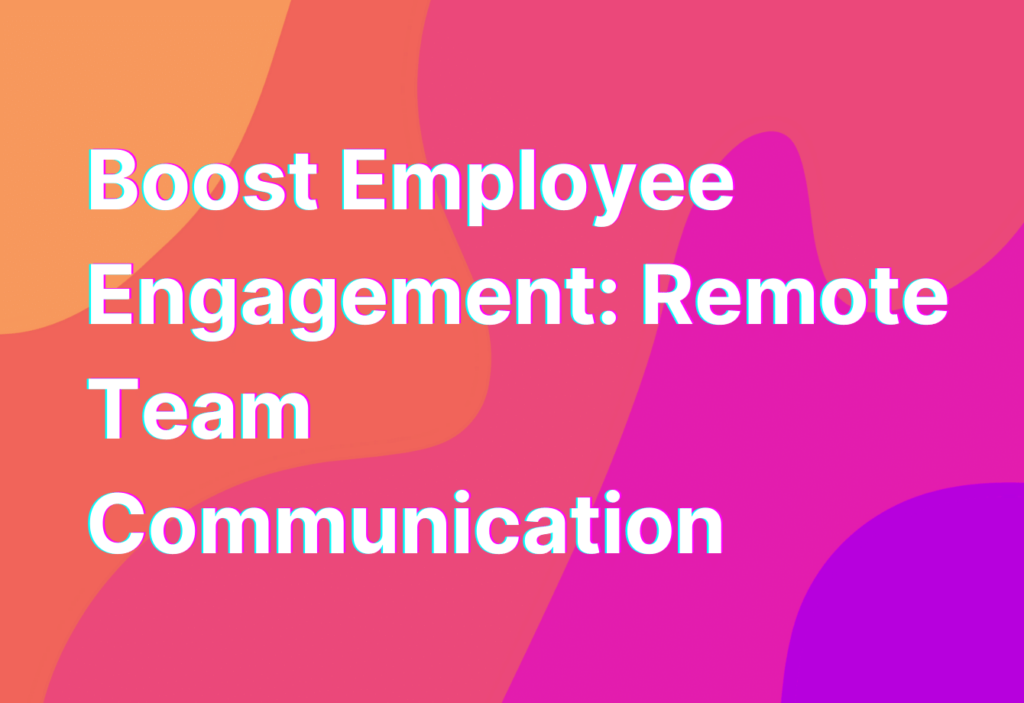Boost Employee Engagement: Remote Team Communication
Hey there, remote work enthusiasts! It’s Ashley, your friendly neighborhood remote work advocate, here to share some tips on how to boost employee engagement through effective remote team communication. As someone with 10 years of remote work experience in the tech industry, I’ve seen firsthand the importance of keeping your team engaged and connected, even when you’re miles apart. So, let’s dive in and explore some strategies that can help you create a thriving remote team!
1. Foster a Culture of Open Communication
Communication is the lifeblood of any successful team, and this holds true for remote teams as well. In fact, it becomes even more crucial when you’re not physically present with your colleagues. Encourage your team members to share their thoughts, ideas, and concerns openly. Create a safe space where everyone feels comfortable expressing themselves.
One way to foster open communication is by utilizing collaboration tools like Trello or Slack. These platforms allow team members to share updates, ask questions, and collaborate on projects in real-time. By providing a centralized space for communication, you can ensure that everyone is on the same page and no one feels left out.
2. Schedule Regular Check-Ins
When you’re working remotely, it’s easy to feel isolated and disconnected from your team. That’s why it’s important to schedule regular check-ins to catch up with your colleagues. These check-ins can be in the form of one-on-one meetings or team-wide video conferences.
During these check-ins, take the time to not only discuss work-related matters but also to check in on your team members’ well-being. Ask about their weekend plans, their hobbies, or even their favorite TV shows. Building personal connections is just as important as discussing work tasks, as it helps create a sense of camaraderie within the team.
3. Encourage Collaboration and Teamwork
Remote work doesn’t mean you have to work in isolation. Encourage collaboration and teamwork among your remote team members. Foster a sense of camaraderie by assigning group projects or tasks that require collaboration.
Tools like Google Docs or Miro can be incredibly helpful for remote collaboration. These platforms allow team members to work together in real-time, making it easy to brainstorm ideas, create presentations, or even design prototypes. By promoting collaboration, you not only boost employee engagement but also enhance the quality of work produced by your team.
4. Provide Opportunities for Skill Development
Remote work offers a unique opportunity for employees to take control of their own professional development. Encourage your team members to expand their skill sets and pursue learning opportunities that align with their interests and career goals.
Platforms like Udemy or Coursera offer a wide range of online courses that can help your team members upskill or learn something new. By investing in their growth, you not only boost their engagement but also show that you value their personal and professional development.
5. Celebrate Milestones and Achievements
Remote work can sometimes feel like a never-ending cycle of tasks and deadlines. It’s important to take a step back and celebrate the milestones and achievements of your team members. Recognize their hard work and let them know that their efforts are valued.
One way to celebrate achievements is by organizing virtual team events or happy hours. Platforms like Zoom or Microsoft Teams allow you to host virtual gatherings where team members can relax, have fun, and bond with each other. Remember, a little celebration can go a long way in boosting employee morale and engagement!
Wrapping Up
Effective communication is the key to boosting employee engagement in remote teams. By fostering a culture of open communication, scheduling regular check-ins, encouraging collaboration, providing opportunities for skill development, and celebrating milestones, you can create a thriving remote team that is engaged, connected, and motivated.
For more tips and strategies on remote team communication, check out our Flexibility and Communication in Remote Team Strategies page. Remember, remote work doesn’t have to be isolating. With the right communication tools and strategies, you can create a remote team that feels like a close-knit family!


